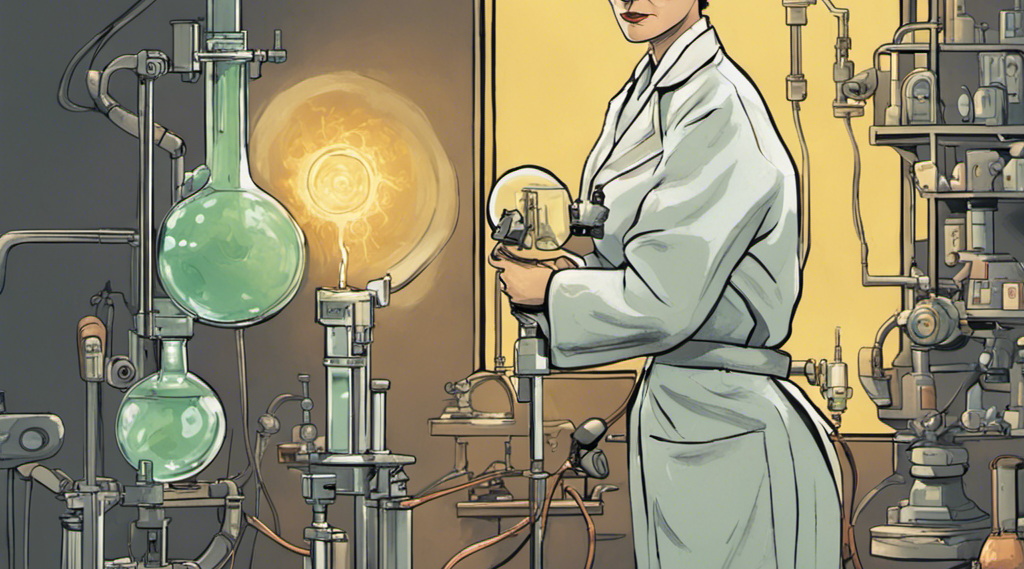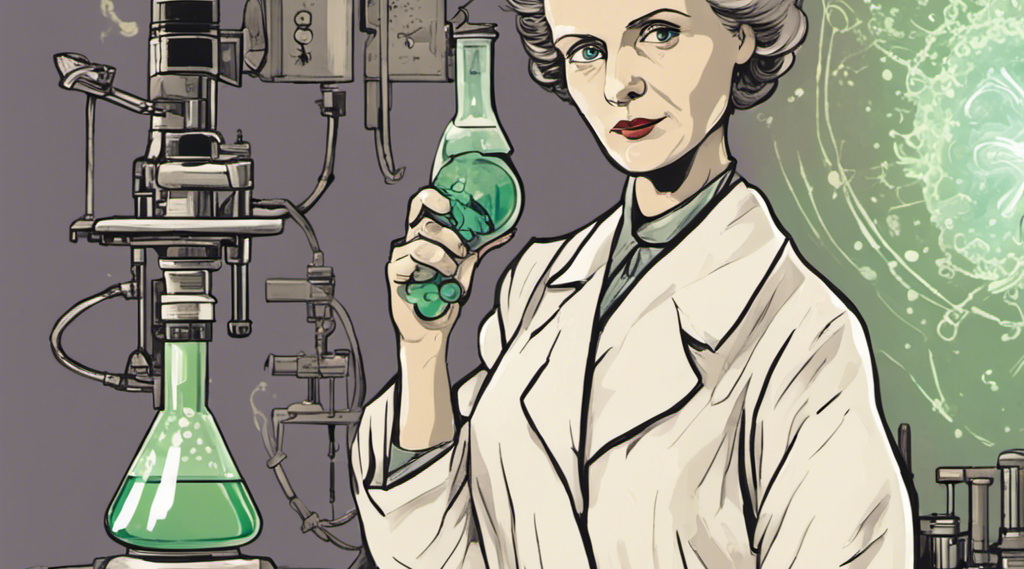
Chapter 1 What’s the Madame Curie
"Madame Curie" is a biography written by Ève Curie, the youngest daughter of Marie Curie. The book provides an intimate and comprehensive account of the life and scientific achievements of her mother, Marie Curie.
Ève Curie offers a personal perspective on her mother's life, delving into Marie Curie's childhood in Poland, her scientific education in Paris, and her groundbreaking research on radioactivity. The biography explores Marie Curie's tireless work alongside her husband Pierre Curie, their joint Nobel Prize win in Physics, and Marie's subsequent solo Nobel Prize in Chemistry.
In addition to highlighting Marie Curie's scientific contributions, Ève Curie also discusses her mother's role as a woman in science during a time when it was rare for women to pursue such careers. She addresses the challenges and discrimination that Marie faced, but also celebrates her determination, resilience, and immense dedication to furthering scientific knowledge.
"Madame Curie" goes beyond the scientific accomplishments and reveals the personal aspects of Marie Curie's life, including her relationship with her family and her struggles as a single mother after Pierre's tragic death. Through her writing, Ève Curie paints a vivid portrait of her mother's remarkable journey, emphasizing her indomitable spirit and profound impact on the field of science.
Overall, "Madame Curie" is a compelling biography that not only celebrates Marie Curie's contributions to science but also honors her as an inspirational figure for women and scientists worldwide.
Chapter 2 Is Madame Curie Valued
"Madame Curie" by Ève Curie is considered a significant biography that sheds light on the life and work of her mother, Marie Curie. The book provides insights into Marie Curie's pioneering contributions to science and her struggles as a woman in a male-dominated field. It has been widely read and appreciated for its historical and inspirational content. The value of any book ultimately depends on individual interests and perspectives.
Chapter 3 Madame Curie’s Summary
This article delves into the remarkable life and achievements of Madame Curie, one of the most influential female scientists in history. From her groundbreaking discoveries in radioactivity to her tireless dedication to scientific research, Marie Curie's story serves as an inspiration to generations of scientists and women worldwide. Explore the incredible journey of this pioneering figure who shattered gender barriers, revolutionized science, and left an indelible mark on the world of physics and chemistry.
Chapter 4 Madame Curie the Author
The book "Madame Curie" is a biography of the renowned scientist Marie Curie, written by Ève Curie. Ève Curie was the second daughter of Marie and Pierre Curie and had a deep admiration for her mother's accomplishments.
Ève Curie released the book "Madame Curie" in 1937. It is a comprehensive account of Marie Curie's life, from her upbringing in Poland to her groundbreaking scientific research on radioactivity, as well as her personal struggles and achievements. The book provides insights into Marie Curie's determination, intellect, and perseverance that led to her becoming the first woman to win a Nobel Prize and the only person to receive Nobel Prizes in two different scientific fields.
Apart from "Madame Curie," Ève Curie wrote several other books throughout her life. Some notable works include:
- "Journey Among Warriors" (1943): In this memoir, Ève recounts her experiences as a war correspondent during World War II. She provides an intimate portrayal of the people affected by the war and the courage she witnessed.
- "And I Alone Survived" (1970): This book is a gripping narrative based on a true story of a plane crash survivor. Ève explores themes of resilience, survival, and the will to live against all odds.
- "Victory" (1972): In this historical novel, Ève Curie tells the story of three women from different backgrounds who become friends during World War II. The book delves into themes of friendship, love, and the impact of war on individuals' lives.
Among Ève Curie's works, "Madame Curie" remains the most celebrated and widely known. It has been praised for its meticulous research, engaging storytelling, and the unique perspective of Marie Curie's daughter. Several editions have been published over the years, including revised editions and translations into multiple languages. The best edition of "Madame Curie" would depend on personal preferences and available resources, but newer editions often include additional information and updates based on further research.

Chapter 5 Madame Curie Meaning & Theme
1. Meaning the Madame Curie
Madame Curie, also known as Marie Curie, was a renowned scientist who made significant contributions to the field of radioactivity. She was the first woman to win a Nobel Prize and remains the only person to have won Nobel Prizes in two different scientific disciplines: physics and chemistry.
The meaning behind Madame Curie's life and work lies in her relentless pursuit of knowledge, her groundbreaking discoveries, and her determination to overcome societal barriers. Despite facing numerous challenges as a woman in a male-dominated scientific community, she persevered and achieved remarkable success in her research.
Curie's discoveries, such as the identification of the elements polonium and radium, revolutionized the understanding of radioactivity and its applications. Her research laid the foundation for future advancements in nuclear physics and medicine, including the development of radiation therapy for cancer treatment.
Beyond her scientific achievements, Madame Curie serves as a symbol of inspiration and empowerment. She challenged conventions, shattered glass ceilings, and paved the way for other women in science. Her dedication, intelligence, and resilience continue to inspire generations of researchers and scientists around the world.
In summary, the meaning of Madame Curie's life lies in her scientific contributions, her perseverance in the face of adversity, and her lasting impact on the field of science. She exemplifies the power of curiosity, determination, and the pursuit of knowledge, serving as an inspiration for all those striving to make a difference in their chosen fields.
2. Theme the Madame Curie
The theme of "Madame Curie" by Ève Curie revolves around the extraordinary life and accomplishments of Marie Curie, a pioneering scientist in the field of radioactivity. This biography delves into various aspects of her personal and professional journey, highlighting key themes such as determination, perseverance, scientific passion, and the challenges faced by women in male-dominated fields.
One prominent theme in the book is Marie Curie's unwavering dedication to her scientific pursuits. Despite numerous obstacles and societal prejudices against women in science during her time, Marie Curie remained driven to uncover the mysteries of radiation. Her relentless pursuit of knowledge and her willingness to overcome adversity serves as an inspiration to readers, emphasizing the importance of pursuing one's passions without giving up.
Another theme explored in the book is the impact of Marie Curie's discoveries on society. Through her research, she not only revolutionized our understanding of radioactivity but also paved the way for significant advancements in medical science. Marie Curie's work led to the development of important technologies like X-rays, which have had a profound impact on various fields, including medicine and industry. The book highlights how her contributions continue to shape our world today, underscoring the long-lasting effects of scientific breakthroughs.
Additionally, the theme of gender inequality and the challenges faced by women in science are prominent throughout the book. Marie Curie faced discrimination and skepticism due to her gender, yet she managed to rise above these obstacles and make groundbreaking discoveries. Ève Curie sheds light on the societal norms and prejudices that Marie Curie encountered, emphasizing the importance of gender equality and the need for equal opportunities in scientific fields.
In summary, "Madame Curie" explores themes of determination, scientific passion, the impact of scientific discoveries on society, and gender inequality. It celebrates the remarkable achievements of Marie Curie, shedding light on her enduring legacy and the barriers she overcame to become one of the most influential scientists in history.

Chapter 6 Investigating Digital Resources about Madame Curie
If you're interested in exploring the various formats and concise summaries of the book "Madame Curie" there are several platforms that we recommend. Bookey is a fantastic option as it offers an extensive collection of books in different formats, accompanied by short summaries that provide a quick overview of each book's content. This is particularly useful for individuals who desire a comprehensive understanding of the book but prefer not to dedicate too much time to it. Additionally, if you prefer a more visual representation of the book's content, YouTube is an excellent resource. With its vast array of videos, such as the "How the Genius of Marie Curie Killed Her" you can gain a more immersive and informative insight into the book. However, please note that we cannot provide a PDF version of "Madame Curie" here. Our primary objective with this article is to introduce you to the enriching reading experience offered by this book and present you with additional reading choices. Enjoy your reading journey!
Chapter 7 Quotes of the Madame Curie
Here are a few notable Madame Curie quotes:
- "Nothing in life is to be feared, it is only to be understood. Now is the time to understand more, so that we may fear less."
- "I am among those who think that science has great beauty. A scientist in his laboratory is not only a technician: he is also a child placed before natural phenomena which impress him like a fairy tale."
- "Be less curious about people and more curious about ideas."
- "You cannot hope to build a better world without improving the individuals. To that end, each of us must work for our own improvement and, at the same time, share a general responsibility for all humanity."
- "One never notices what has been done; one can only see what remains to be done."
These quotes reflect Marie Curie's dedication to scientific discovery, her passion for understanding the world around her, her belief in the power of education and personal growth, and her commitment to making a positive impact on humanity.
Chapter 8 Similar Books Like Madame Curie
If you enjoyed reading "Madame Curie" and would like to explore similar books, here are a few recommendations that delve into the lives of notable women in science or biographies of other esteemed scientists:
- “Freud” by Peter Gay: Gain a comprehensive understanding of Freud's revolutionary theories, his personal struggles, and the lasting impact he had on psychology and society as a whole.
- "Hidden Figures: The American Dream and the Untold Story of the Black Women Mathematicians Who Helped Win the Space Race" by Margot Lee Shetterly: This captivating account highlights the contributions of African-American female mathematicians at NASA during the early days of the space program.
- "Lab Girl" by Hope Jahren: A memoir by acclaimed scientist Hope Jahren, this book intertwines her personal journey as a geobiologist with fascinating insights into the world of plants and scientific discovery.
- "The Radium Girls: The Dark Story of America's Shining Women" by Kate Moore: This eye-opening historical account sheds light on the struggles and triumphs of women workers in the early 20th century who were exposed to radiation while painting watch dials with radium.
- "The Invention of Nature: Alexander von Humboldt's New World" by Andrea Wulf: This biography explores the life and accomplishments of Alexander von Humboldt, a visionary scientist who shaped our understanding of nature and ecology.
- "The Immortal Life of Henrietta Lacks" by Rebecca Skloot: This book tells the gripping story of Henrietta Lacks, an African-American woman whose cells were unknowingly used for scientific research, leading to remarkable medical discoveries.
These books offer compelling stories of scientific pioneers, highlighting their achievements, struggles, and the impact they had on their respective fields.